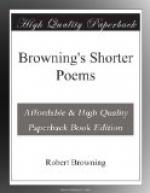When it is urged that for a poet the intellectual energies are too strong in Browning, that for poetry the play of intellectual interests and activities is too great in his work, and that Browning often and at times ruthlessly sacrifices the requirements and effects of art for the expression of thought, that “though he refreshes the heart he tires the brain,” we should admit this with regard to a good deal of the work of the third period. We should allow that this is the side to which he leans generally, but still hold that, though to many his intellectual quality and energy may well seem excessive, yet in great part of his work, and that of course, his best, the passion of the poet and his kind of imagination are just as fresh and powerful as the intellectual force and subtlety are keen and abundant.—JAMES FROTHINGHAM, Studies of the Mind and Art of Robert Browning.
Now dumb is he who waked the world to
speak,
And voiceless hangs the world beside his
bier,
Our words are sobs, our cry or praise
a tear:
We are the smitten mortal, we the weak.
We see a spirit on earth’s loftiest
peak
Shine, and wing hence the way he makes
more clear:
See a great Tree of Life that never sere
Dropped leaf for aught that age or storms
might wreak;
Such ending is not death: such living
shows
What wide illumination brightness sheds
From one big heart,—to conquer
man’s old foes:
The coward, and the tyrant, and the force
Of all those weedy monsters raising heads
When Song is muck from springs of turbid
source.
—GEORGE MEREDITH.
* * * * *
CHRONOLOGICAL LIST OF BROWNING’S WORKS
1833. Pauline.
1835. Paracelsus.
1837. Strafford (A tragedy).
1840. Sordello.
1841. Bells and Pomegranates, No I.,
Pippa Passes.
1842. Bells and Pomegranates, No. II.,
King Victor and King Charles.
1842. Bells and Pomegranates, No. III.,
Dramatic Lyrics.
Cavalier Tunes.
Italy and France.
Camp and Cloister.
In a Gondola.
Artemis Prologises.
Waring.
Queen Worship.
Madhouse Cells.
Through the Metidja.
The Pied Piper of Hamelin.
1843. Bells and Pomegranates, No. IV.,
The Return of the Druses (A tragedy).
1843. Bells and Pomegranates, No. V.,
A Blot In the ’Scutcheon (A tragedy).




